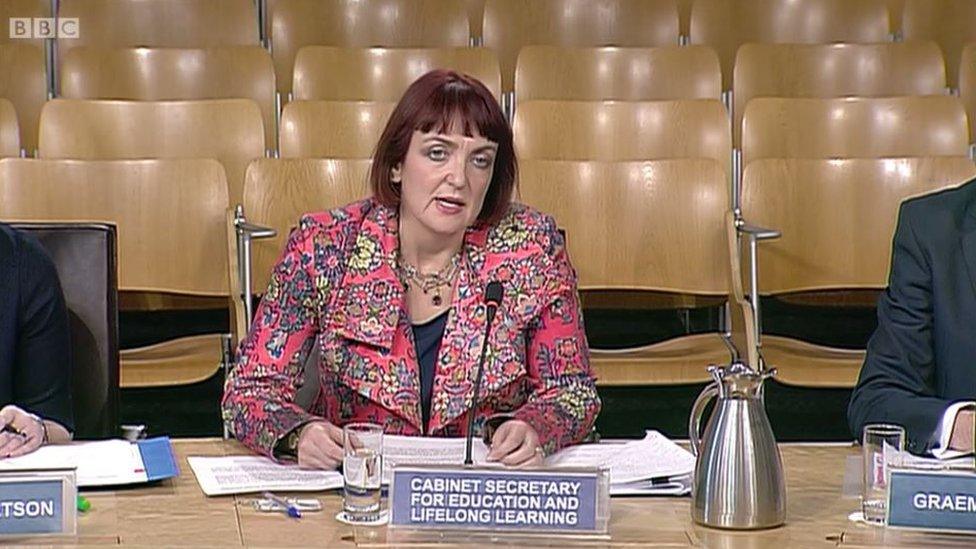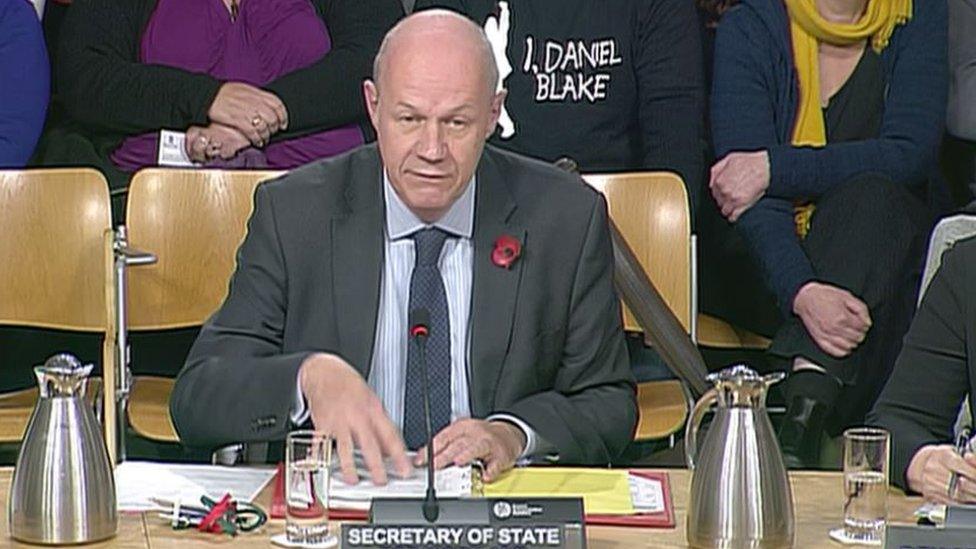UK may continue to administer Scots benefits after devolution
- Published

The Scottish government is to take over delivery of benefits including disability living allowances
The UK government may continue to administer some benefits for several years after legislative control over them is passed to Holyrood.
Power over 11 benefits is being devolved, but the UK government could continue to oversee delivery of some until 2020 to "minimise risk".
Social Security Secretary Angela Constance said the transfer of powers would be complete in the current term.
However opposition parties claimed the SNP were "terrified" of responsibility.
The Scottish and UK governments are examining a "split competency" approach for the new devolved benefits, which are worth about £2.7bn. This would see Holyrood given legislative powers over a series benefits from June 2017, but not over delivery of some of them until April 2020.
The 11 benefits being devolved include carer's allowances, disability living allowances, personal independence payments, maternity grants and winter fuel payments, while the UK government will retain control over other areas such as Universal Credit.
A Scottish social security agency will be set up to deliver the devolved benefits, with a Social Security Bill introduced at Holyrood by June 2017.
'Pragmatic and novel'
The "split competency" plans were revealed in the minutes of a joint ministerial working group meeting in October, which was attended by Ms Constance, Scottish Secretary David Mundell, UK Work and Pensions Secretary Damian Green and Scottish Employability and Training Minister Jamie Hepburn.
Mr Green notes that the UK was "willing to commit to try the untested method of splitting competence", agreeing to transfer legislative power by June 2017 but retaining "executive competence" for several more years "to minimise risk and complexity".
Mr Mundell agreed this was a "pragmatic and novel approach", although the group did note that there was a "significant and untested legal process" involved.

Ms Constance said the transfer of powers would be complete by the end of the Holyrood term
Ms Constance told BBC Scotland that the government was committed to a programme of work "over the lifetime of this parliament", noting that some benefits will take longer than others to transfer.
She said: "By the end of this parliamentary term, Scotland will have its first ever Scottish Social Security Agency, in a position to deliver those vital benefits - benefits that one in four people are in receipt of.
"In terms of the precise programme, that is negotiated with the UK government. It is imperative that we work closely with them and the DWP, because we have 15% of the welfare state, we have to make sure that 15% is plugged back into the remaining 85%.
"There are some benefits we will be able to deliver sooner, there are other benefits that are more complex and we must take absolute care to ensure that we get this right. We have to ensure that people get the money they are entitled to on time, and that all of this is done with dignity respect and fairness at its very heart.
"Of course we'll be keeping parliament and the social security committee fully informed of our work in this area and of the timetable as it develops."

The plans were discussed with UK work and pensions minister Damian Green, who later gave evidence at Holyrood
Opposition parties claimed the approach showed the SNP "prefer complaining to governing".
Scottish Conservative welfare spokesman Adam Tomkins said: "The SNP demanded welfare powers at Holyrood, now that they've got responsibility they seem to be terrified of getting on with it.
"The 'unique split competence approach' appears to be code for the Scottish ministers wanting to slow down and delay the transfer of devolved welfare powers.
"They would rather complain about the DWP than get on with the day job of making social security devolution work as smoothly and as quickly as possible for the people of Scotland. It's yet another example of SNP moaning rather than governing."
'Vulnerable citizens'
Scottish Labour's Iain Gray said there had been an "astonishing failure" on the part of the Scottish government, which he said had resulted in a "humiliating climb-down".
Mr Gray said SNP members of the Smith Commission - which drew up the plans for greater devolution to Holyrood - had continued to argue for more and greater powers over welfare that those which were ultimately agreed.
He added: "Now it turns out that the SNP government has had to ask the UK government to delay transferring responsibility for disability benefits because, even although they wanted more welfare powers, they have not managed to get a new system in place in time to manage those which are coming to Scotland.
"For years SNP ministers have, rightly, criticised Tory reforms to welfare benefits for treating people with disabilities cruelly. They have promised that they would restore respect and dignity in the new Scottish social security system.
"Now it seems they are prepared to leave some of Scotland's most vulnerable citizens to the mercies of a Tory government for another three or four years".
Ms Constance insisted that the work was progressing apace and "in a planned manner".
- Published9 November 2016
